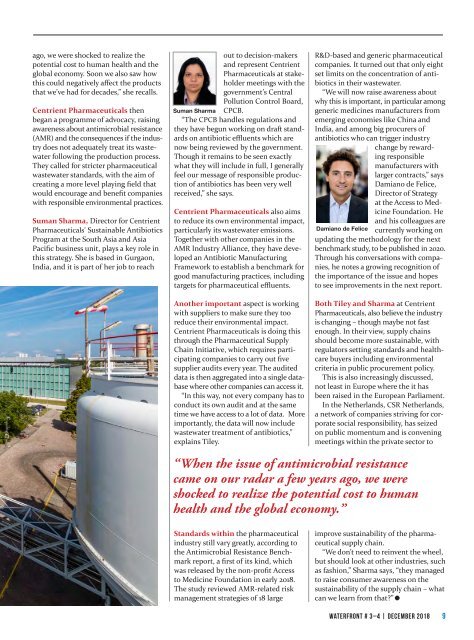Water Front #3-4 2018
You also want an ePaper? Increase the reach of your titles
YUMPU automatically turns print PDFs into web optimized ePapers that Google loves.
ago, we were shocked to realize the<br />
potential cost to human health and the<br />
global economy. Soon we also saw how<br />
this could negatively affect the products<br />
that we’ve had for decades,” she recalls.<br />
Centrient Pharmaceuticals then<br />
began a programme of advocacy, raising<br />
awareness about antimicrobial resistance<br />
(AMR) and the consequences if the industry<br />
does not adequately treat its wastewater<br />
following the production process.<br />
They called for stricter pharmaceutical<br />
wastewater standards, with the aim of<br />
creating a more level playing field that<br />
would encourage and benefit companies<br />
with responsible environmental practices.<br />
Suman Sharma, Director for Centrient<br />
Pharmaceuticals' Sustainable Antibiotics<br />
Program at the South Asia and Asia<br />
Pacific business unit, plays a key role in<br />
this strategy. She is based in Gurgaon,<br />
India, and it is part of her job to reach<br />
out to decision-makers<br />
and represent Centrient<br />
Pharmaceuticals at stakeholder<br />
meetings with the<br />
government’s Central<br />
Pollution Control Board,<br />
Suman Sharma CPCB.<br />
“The CPCB handles regulations and<br />
they have begun working on draft standards<br />
on antibiotic effluents which are<br />
now being reviewed by the government.<br />
Though it remains to be seen exactly<br />
what they will include in full, I generally<br />
feel our message of responsible production<br />
of antibiotics has been very well<br />
received,” she says.<br />
Centrient Pharmaceuticals also aims<br />
to reduce its own environmental impact,<br />
particularly its wastewater emissions.<br />
Together with other companies in the<br />
AMR Industry Alliance, they have developed<br />
an Antibiotic Manufacturing<br />
Framework to establish a benchmark for<br />
good manufacturing practices, including<br />
targets for pharmaceutical effluents.<br />
Another important aspect is working<br />
with suppliers to make sure they too<br />
reduce their environmental impact.<br />
Centrient Pharmaceuticals is doing this<br />
through the Pharmaceutical Supply<br />
Chain Initiative, which requires participating<br />
companies to carry out five<br />
supplier audits every year. The audited<br />
data is then aggregated into a single datab<br />
ase where other companies can access it.<br />
“In this way, not every company has to<br />
conduct its own audit and at the same<br />
time we have access to a lot of data. More<br />
importantly, the data will now include<br />
wastewater treatment of antibiotics,”<br />
explains Tiley.<br />
R&D-based and generic pharmaceutical<br />
companies. It turned out that only eight<br />
set limits on the concentration of antibiotics<br />
in their wastewater.<br />
“We will now raise awareness about<br />
why this is important, in particular among<br />
generic medicines manufacturers from<br />
emerging economies like China and<br />
India, and among big procurers of<br />
antibiotics who can trigger industry<br />
change by rewarding<br />
responsible<br />
manufacturers with<br />
larger contracts,” says<br />
Damiano de Felice,<br />
Director of Strategy<br />
at the Access to Medicine<br />
Foundation. He<br />
Damiano de Felice<br />
and his colleagues are<br />
currently working on<br />
updating the methodology for the next<br />
benchmark study, to be published in 2020.<br />
Through his conversations with companies,<br />
he notes a growing recognition of<br />
the importance of the issue and hopes<br />
to see improvements in the next report.<br />
Both Tiley and Sharma at Centrient<br />
Pharmaceuticals, also believe the industry<br />
is changing – though maybe not fast<br />
enough. In their view, supply chains<br />
should become more sustainable, with<br />
regulators setting standards and healthcare<br />
buyers including environmental<br />
criteria in public procurement policy.<br />
This is also increasingly discussed,<br />
not least in Europe where the it has<br />
been raised in the European Parliament.<br />
In the Netherlands, CSR Netherlands,<br />
a network of companies striving for corporate<br />
social responsibility, has seized<br />
on public momentum and is convening<br />
meetings within the private sector to<br />
“When the issue of antimicrobial resistance<br />
came on our radar a few years ago, we were<br />
shocked to realize the potential cost to human<br />
health and the global economy.”<br />
Alba Tiley, Global head of DSM Sinochem’s Sustainable Antibiotics Program.<br />
Standards within the pharmaceutical<br />
industry still vary greatly, according to<br />
the Antimicrobial Resistance Benchmark<br />
report, a first of its kind, which<br />
was released by the non-profit Access<br />
to Medicine Foundation in early <strong>2018</strong>.<br />
The study reviewed AMR-related risk<br />
management strategies of 18 large<br />
improve sustainability of the pharmaceutical<br />
supply chain.<br />
“We don’t need to reinvent the wheel,<br />
but should look at other industries, such<br />
as fashion,” Sharma says, “they managed<br />
to raise consumer awareness on the<br />
sustainability of the supply chain – what<br />
can we learn from that?”<br />
WATERFRONT # 3–4 | december <strong>2018</strong><br />
9


















